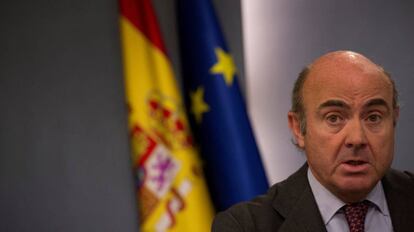Spain’s economy minister to become the next vice-president of the ECB
Pending ratification, Luis de Guindos will become Mario Draghi’s number two after the only other candidate, the head of the Bank of Ireland, stepped aside

Spain’s current economy minister, Luis de Guindos, will be the new vice-president of the European Central Bank (ECB), after the other candidate for the post, the governor of the Bank of Ireland Philip Lane, stepped aside. The Eurogroup – the meeting of economy and finance ministers from across the euro zone, of which De Guindos has formed part since 2012 – has anointed the Spaniard as the number-two of current President Mario Draghi.
The appointment will see De Guindos break a tradition, by becoming the first ever economy minister to directly ascend to the position. The move will also end five years of Spain being marginalized when it comes to posts within international and European institutions.
The EU’s Economic and Financial Affairs Council (Ecofin) will officially recommend De Guindos for the role tomorrow, and heads of state and government will ratify the decision in the spring.
Supported by Germany and France, De Guindos – who in 2015 failed in his bid to win the presidency of the Eurogroup – beat out Philip Lane, a brilliant economist and the current governor of Ireland’s central bank. He will be replacing the Portuguese Vítor Constâncio in Frankfurt at the end of May, despite the fact that both the ECB and the European Parliament would have preferred Lane for the role.
Italy attempted to block the decision at the last moment, arguing that the political profile of De Guindos would endanger the independence of the ECB, which is encoded in an international treaty. Italy took this position partly in response to Madrid’s failure to support Milan as the new home of the European Medicines Agency, but also due to the battle over who will succeed Mario Draghi. Italy fears it will be left out of the leadership of the ECB once Draghi steps down. But they failed to succeed, due to the widespread support of Guindos from powerful factions.
De Guindos has been one of the major allies of Germany’s Wolfgang Schäuble for the last five years, and Berlin repaid that loyalty with its vote (on the condition that Spain would back its candidate for the ECB presidency). France had its doubts, but eventually opted for De Guindos, stating that the Spaniard has “relevant experience and personal merits for the role.” Spain will also now support Paris’s bid to become the new home of the European Banking Authority (EBA).
Portugal backed Spain after Guindos supported Mário Centeno for the presidency of the Eurogroup.
And so it goes. The policy of De Guindos to secure favors over recent years – years that have seen Spain lose its influence in European institutions – has finally brought results.
De Guindos has had a controversial career in the private sector, which has seen him serve as chairman of Lehman Brothers in Spain and Portugal, as well as serving on the board and as president of the auditing committee for BMN, a lender that was later nationalized. In the public sector he served as number two to disgraced banker and former minister Rodrigo Rato, and as a minister for the last six years. “Six years that have felt like 60,” he said in a recent interview.
It is not yet clear when he will quit his role as a minister, but he will soon be leaving his office in Madrid’s Castellana boulevard. His destination is a tower block in Frankfurt, one that looks like a cross between Hogwarts in Harry Potter and Darth Vader’s Death Star.
The next battle within the ECB will be for a post even more important than that of De Guindos: Draghi will be leaving in November 2019 and Germany will then have the right to seek the support of De Guindos to try to get one of its own in the role. The likely candidate will be Jens Weidmann, the governor of the Bundesbank. He has been consistently opposed to the lowering of interest rates, as well as the multi-billion bond purchase program, and the other extraordinary measures that explain Spain’s emergence from the economic crisis – and the subsequent recovery that De Guindos has wielded as his big achievement to get into to the ECB.
English version by Simon Hunter.
Tu suscripción se está usando en otro dispositivo
¿Quieres añadir otro usuario a tu suscripción?
Si continúas leyendo en este dispositivo, no se podrá leer en el otro.
FlechaTu suscripción se está usando en otro dispositivo y solo puedes acceder a EL PAÍS desde un dispositivo a la vez.
Si quieres compartir tu cuenta, cambia tu suscripción a la modalidad Premium, así podrás añadir otro usuario. Cada uno accederá con su propia cuenta de email, lo que os permitirá personalizar vuestra experiencia en EL PAÍS.
¿Tienes una suscripción de empresa? Accede aquí para contratar más cuentas.
En el caso de no saber quién está usando tu cuenta, te recomendamos cambiar tu contraseña aquí.
Si decides continuar compartiendo tu cuenta, este mensaje se mostrará en tu dispositivo y en el de la otra persona que está usando tu cuenta de forma indefinida, afectando a tu experiencia de lectura. Puedes consultar aquí los términos y condiciones de la suscripción digital.









































